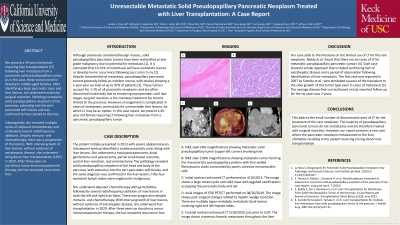Monday Poster Session
Category: Liver
P2526 - Unresectable Metastatic Solid Pseudopapillary Pancreatic Neoplasm Treated With Liver Transplantation: A Case Report
Monday, October 23, 2023
10:30 AM - 4:15 PM PT
Location: Exhibit Hall

Has Audio

Jordan L. Pace, BS
California University of Science and Medicine
Presenting Author(s)
Award: Presidential Poster Award
Jordan L. Pace, BS1, Michelle D. Hopstone, MD2, Peter S. Conti, MD, PhD2, Chloe Tom, MD2, Passant Mohamed, MD2, Yuna Gong, MD2, Navpreet Kaur, MD2, Jeffrey A. Kahn, MD3
1California University of Science and Medicine, Colton, CA; 2Keck School of Medicine of USC, Los Angeles, CA; 3Keck School of Medicine, University of Southern California, Los Angeles, CA
Introduction: We present a 49-year-old female requiring liver transplantation (LT) following liver metastasis originating from a pancreatic solid pseudopapillary tumor. Solid pseudopapillary pancreatic tumors were previously considered benign but have been reclassified as low-grade malignancy due to potential for spread. They are very rare pancreatic neoplasms that are often discovered incidentally during unrelated imaging, as patients generally remain asymptomatic until late stages. Resection is the mainstay treatment for uncomplicated tumors limited to the pancreas, but management is complicated in cases of metastases, particularly for unresectable liver lesions, for which LT may be an option.
Case Description/Methods: The patient initially presented in 2013 with severe abdominal pain. Subsequent workup identified a large pancreatic mass along with liver lesions. She underwent a total pancreatectomy, distal gastrectomy and splenectomy, partial small bowel resection, and central resection of the liver and omentectomy. The pathology revealed solid pseudopapillary neoplasm of the head and body of the pancreas, with extension into the peri-pancreatic soft tissues, and the same diagnosis was confirmed in the liver lesions. Fifty-four examined lymph nodes were negative for malignancy.
She underwent adjuvant chemotherapy with gemcitabine, followed by several radiofrequency ablations of new lesions in both the left and right liver lobes. There was progression despite immuno- and chemotherapy.
With interval growth of liver lesions, without evidence of extrahepatic disease, she underwent living donor liver transplantation (LDLT) in 2020. After three years, on tacrolimus mono-immunosuppressive therapy, she has remained recurrence free.
Discussion: Our case adds to the literature on the limited use of LT for this rare neoplasm. Reddy et al. found that there are six cases of LT for metastatic pseudopapillary pancreatic tumors. Each case shared a similar approach that included confirming lack of extrahepatic disease and a period of observation following identification of liver metastasis. The first case was reported in 2007 by Sumida et al., who attributed success of the transplant to the slow growth of this tumor type even in cases of metastasis. All six cases occurred in females with an average age of 31. The average disease-free survival based on last reported follow-up for the six cases was 2 years (2 years, 2 years, 9 months, 5 years, 1 year, and 15 months, respectively).

Disclosures:
Jordan L. Pace, BS1, Michelle D. Hopstone, MD2, Peter S. Conti, MD, PhD2, Chloe Tom, MD2, Passant Mohamed, MD2, Yuna Gong, MD2, Navpreet Kaur, MD2, Jeffrey A. Kahn, MD3. P2526 - Unresectable Metastatic Solid Pseudopapillary Pancreatic Neoplasm Treated With Liver Transplantation: A Case Report, ACG 2023 Annual Scientific Meeting Abstracts. Vancouver, BC, Canada: American College of Gastroenterology.
Jordan L. Pace, BS1, Michelle D. Hopstone, MD2, Peter S. Conti, MD, PhD2, Chloe Tom, MD2, Passant Mohamed, MD2, Yuna Gong, MD2, Navpreet Kaur, MD2, Jeffrey A. Kahn, MD3
1California University of Science and Medicine, Colton, CA; 2Keck School of Medicine of USC, Los Angeles, CA; 3Keck School of Medicine, University of Southern California, Los Angeles, CA
Introduction: We present a 49-year-old female requiring liver transplantation (LT) following liver metastasis originating from a pancreatic solid pseudopapillary tumor. Solid pseudopapillary pancreatic tumors were previously considered benign but have been reclassified as low-grade malignancy due to potential for spread. They are very rare pancreatic neoplasms that are often discovered incidentally during unrelated imaging, as patients generally remain asymptomatic until late stages. Resection is the mainstay treatment for uncomplicated tumors limited to the pancreas, but management is complicated in cases of metastases, particularly for unresectable liver lesions, for which LT may be an option.
Case Description/Methods: The patient initially presented in 2013 with severe abdominal pain. Subsequent workup identified a large pancreatic mass along with liver lesions. She underwent a total pancreatectomy, distal gastrectomy and splenectomy, partial small bowel resection, and central resection of the liver and omentectomy. The pathology revealed solid pseudopapillary neoplasm of the head and body of the pancreas, with extension into the peri-pancreatic soft tissues, and the same diagnosis was confirmed in the liver lesions. Fifty-four examined lymph nodes were negative for malignancy.
She underwent adjuvant chemotherapy with gemcitabine, followed by several radiofrequency ablations of new lesions in both the left and right liver lobes. There was progression despite immuno- and chemotherapy.
With interval growth of liver lesions, without evidence of extrahepatic disease, she underwent living donor liver transplantation (LDLT) in 2020. After three years, on tacrolimus mono-immunosuppressive therapy, she has remained recurrence free.
Discussion: Our case adds to the literature on the limited use of LT for this rare neoplasm. Reddy et al. found that there are six cases of LT for metastatic pseudopapillary pancreatic tumors. Each case shared a similar approach that included confirming lack of extrahepatic disease and a period of observation following identification of liver metastasis. The first case was reported in 2007 by Sumida et al., who attributed success of the transplant to the slow growth of this tumor type even in cases of metastasis. All six cases occurred in females with an average age of 31. The average disease-free survival based on last reported follow-up for the six cases was 2 years (2 years, 2 years, 9 months, 5 years, 1 year, and 15 months, respectively).

Figure: A: H&E stain (40x magnification) showing metastatic solid pseudopapillary tumor (upper left corner) involving liver.
B: H&E stain (100x magnification) showing metastatic tumor forming the characteristic pseudopapillary pattern with thin-walled fibrovascular stalks surrounded by poorly cohesive monomorphic cells.
C: Initial contrast enhanced CT performed on 4/16/2013. The image shows a large mixed cystic and solid mass with eggshell calcifications occupying the pancreatic body and tail.
D: Axial images of fluorodeoxyglucose (FDG) PET/CT performed on 08/20/2019. The image shows post-surgical changes related to hepatic wedge resection. There are multiple hyper-metabolic metastatic focal lesions involving right and left hepatic lobes.
E: Coronal contrast enhanced CT 5/18/2020, just prior to LDLT. The image shows numerous hepatic metastases throughout the liver.
B: H&E stain (100x magnification) showing metastatic tumor forming the characteristic pseudopapillary pattern with thin-walled fibrovascular stalks surrounded by poorly cohesive monomorphic cells.
C: Initial contrast enhanced CT performed on 4/16/2013. The image shows a large mixed cystic and solid mass with eggshell calcifications occupying the pancreatic body and tail.
D: Axial images of fluorodeoxyglucose (FDG) PET/CT performed on 08/20/2019. The image shows post-surgical changes related to hepatic wedge resection. There are multiple hyper-metabolic metastatic focal lesions involving right and left hepatic lobes.
E: Coronal contrast enhanced CT 5/18/2020, just prior to LDLT. The image shows numerous hepatic metastases throughout the liver.
Disclosures:
Jordan Pace indicated no relevant financial relationships.
Michelle Hopstone indicated no relevant financial relationships.
Peter Conti indicated no relevant financial relationships.
Chloe Tom indicated no relevant financial relationships.
Passant Mohamed indicated no relevant financial relationships.
Yuna Gong indicated no relevant financial relationships.
Navpreet Kaur indicated no relevant financial relationships.
Jeffrey Kahn indicated no relevant financial relationships.
Jordan L. Pace, BS1, Michelle D. Hopstone, MD2, Peter S. Conti, MD, PhD2, Chloe Tom, MD2, Passant Mohamed, MD2, Yuna Gong, MD2, Navpreet Kaur, MD2, Jeffrey A. Kahn, MD3. P2526 - Unresectable Metastatic Solid Pseudopapillary Pancreatic Neoplasm Treated With Liver Transplantation: A Case Report, ACG 2023 Annual Scientific Meeting Abstracts. Vancouver, BC, Canada: American College of Gastroenterology.

